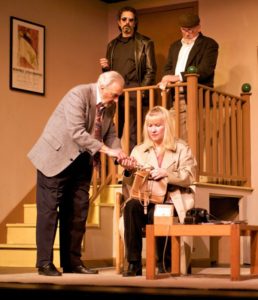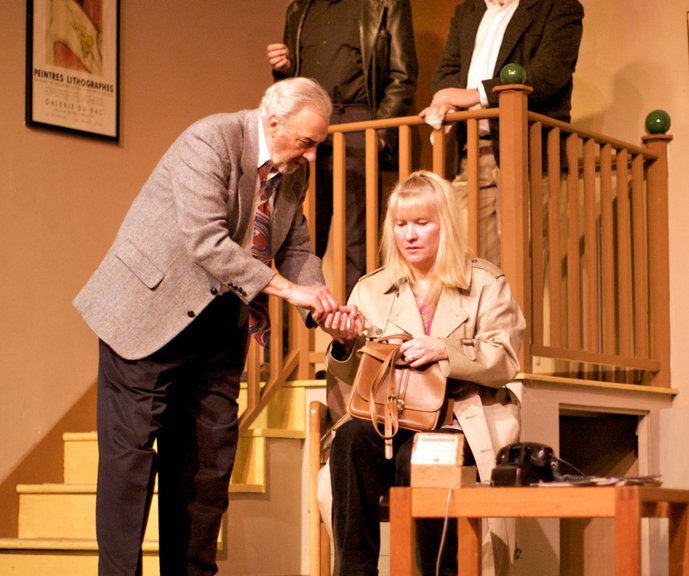I want to continue the topic I started yesterday.
Acting is clearly an art. The actor creates a performance for their character, just as a painter creates a work of art in their painting. But: In both cases, there is a craft to the art. The painter needs to understand the differences in different media, the actor need to understand the craft of acting. That is where many aspiring actors fall short. Yes, you can learn to act by getting on stage and learning on the job. A painter can also learn about media and styles and brushes by trial and error.
As the director of a play, I spend a good amount of time teaching the newer actors the basics of theater. Time I really don’t have. Today we are going to talk about actors who have talent and have taken significant amounts of training. Some of the actors I work with majored or minored in theater in college. A great start. Others, who may have found acting later in life, are able to take ongoing acting classes. Also a great way to learn the craft.
Several years ago, I was holding auditions for a play. One by one the actors came on stage to read from the script. One actor, was rolling around on the stage floor as he read his lines. I cast him and later asked him what he was doing during the audition. He said that in college there were so many people auditioning for each role, you had to do something to catch the directors eye. I told him that he caught my eye but I cast him anyway.
The naturals may be good but it is the hard working actors that form the spine that makes a play work. Rereading what I wrote yesterday, I made it sound like the Director did all the work. Not so. The director is the guide but it is the actor who finally develops the character. Early on in rehearsals,the director understands the character better than the actor. There comes a point in the rehearsal process where the actor understands the character they have built better than I do, and I yield to what they think (usually).
Hard working actors take risks. It’s scary to be on stage, particularly when the scene calls for crying, kissing, sexually suggestive scenes or partial nudity. Some actors skate around the edges, hoping that the Director will forget about it. Others just jump in.
A few years ago, I directed a play that required an actress to strip to her bra and panties and climb into bed with her scene partner. These were not granny panties but something a young woman would actually wear (she used her own clothes). I was nervous about it and was holding back. One night a good friend (and great actress) came to the rehearsal and said we needed to get it on, we needed to get past the giggle stage. She was right and we did it. By the time the show opened, the actor was so comfortable in her bra and panties she never even thought about it. That is brave.
Several years ago, we presented “Wait Until Dark”, a play based on the movie with Audrey Hepburn and Alan Arkin about a blind woman who is terrorized by criminals looking for drugs. The woman who played Suzy, the blind woman, actually taught herself to not see. She was able to ignore the visual signals from her eye the the point that, a couple of years after the show had closed, she was in a Costco about 40 miles away and a man came up to her and said “You can see.” She had no idea what he was talking about. He explained that he had been on Orcas and had come to the production and thought it was wonderful that we had cast a blind person in that role. That is a hard working actor!! (Also one of my top five all time plays.)
As long as I am talking about “Wait Until Dark”, I want to digress and talk about some of the things we did that made it such a wonderful play. Digress? Me?
All great plays start with a great script. At least a script the looks and sounds great to me. A great play needs great actors. Besides the actor who played Suzy, the actor who played Roat was just perfect in that role. Really scary. Really believable. The other actors were also very good but the play is about Suzy and Roat: Who will live and who will die. Talk about high stakes!!!
Like we did with “Almost, Maine” we made a road trip to see the play at another theater about 150 miles away. We learned a lot about what worked but even more about what didn’t work. For example, in the second act, when Suzy knows the Roat will be coming to kill her, she breaks or disconnects all the lights in the room to put them on an even footing. In the off island production we saw, the light in the tech booth spilled out and we could see everything that was happening. In our production, I spent three days making sure there was not a bit of light in the entire building. We even had people holding up signs to block the light from the exit signs. We turned off the monitors on the computers in the tech booth. One of the reviewers said that she could understand what it felt like to be blind and know what is happening only by the sounds of people moving around. When Roat opens the refrigerator door and the room is lit by the light in the refrigerator, people in the audience screamed. Every night. Even those who knew what was coming screamed.
The script has three scenes in Act II. I the off island production we saw, one of the bad guys (the good bad guy) is killed by Roat. In the scene change, we watched the guy who was killed get up and walk off stage. Every time you have a scene change the audience drops out of the moment of watching the play and it takes three to five minutes to get them back “in the moment”. I didn’t want that. Once the tension starts to build in Act II, I didn’t want to let the audience to have a chance to release the tension. We did Act II as one scene. It took us a long time to figure out how to kill Talman and get his body off stage without stopping the action. Finally, after Talman has shown his good side and is trying to help Suzy, he starts to exit. He opens the door, then turns back to Suzy to say his last line. All of a sudden, we see Roat’s face over Talman’s shoulder. The audience gasps and Roat stabs Talman. Then as Talman collapses, Roat eases him off stage while Suzy screams as she is trying to figure out what is happening.
The other scene change is to cover a 20 or 30 minute period as Roat goes on a wild goose chase to get the drugs. We covered that time with about three minutes of time with Suzy preparing for the inevitable return of Roat. No one ever noticed the time disconnect because they were so engrossed in the play.
I loved how we made the audience scream. I have been looking for another really scary thriller ever since without luck.
Now back to the main point (no not, “Love Song” but we are getting closer): Types of actors.
The final group are those who don’t have a clue and don’t seem particularly interested in getting a clue. They are actors who stay “in their head”. Think back to yesterday when I talked about all the questions I ask actors. What I am trying to do is build a internal world inside the actor that their character inhabits. That is the only way that actors can be truthful. A friend calls it: “Being truthful in the imaginary circumstances of the play”.
People who are “in their heads” try to figure out how to say their lines – a mechanical process at best. Something that will never appear real on the stage although those actors believe they are saying their line right. I have had several of this type of actors tell me: I know my lines, I know my blocking. Why do I have to come to rehearsals? They don’t have a clue.
I also need to add that some actors are just not able to get out of their heads no matter how much training they get. There is something inside them that will not let go and needs to be in control all the time. They have a clue but still aren’t good actors.
Which reminds me of a story:
When Jack Nicholson was just beginning in the movies, he was doing a scene in a movie. His director kept telling him “Less, Jack”. Nicholson would do the scene again and again the director would say “Less, Jack”. Finally after several iterations, the director said “Less, Jack”. Jack Nicholson told him: “If I do any less, I won’t be acting at all.” “Precisely”, said the director.
Don’t act: Just Be. Be the character. Something I tell my actors all the time: “Trust the work and just say your lines.” If you have worked hard, it will be right.
A photo of Wait Until Dark




